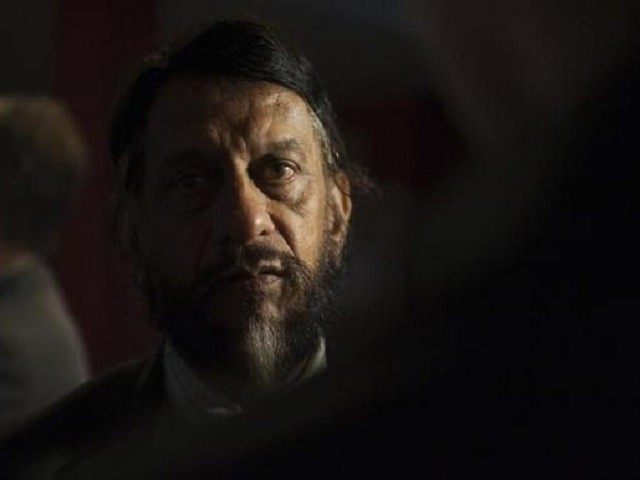So Rajendra Pachauri has finally announced his resignation from the Intergovernmental Panel on Climate Change (IPCC) – a decision at once momentous and spectacularly irrelevant.
It’s momentous because the IPCC is one of the world’s most powerful organisations, with presidents and prime ministers across the globe in thrall to its prognostications of climate doom, and the fate of nations and economies partly decided by its ongoing insistence (against all evidence) that “global warming” remains a credible crisis which can only be solved by throwing stupendous quantities of taxpayer money at it.
And it’s spectacularly irrelevant because the bearded, cricket-loving, ice-shunning groper was never more than an empty figurehead, probably chosen – a bit like UN Secretaries General – because he fitted the right ethnic and socio-political profile rather than because he had a particular skill set which qualified him especially for the job. He was, after all, a railway engineer by training, not a physicist or a meteorologist or a climatologist.
Which was probably, for those of us on the sceptical side of the argument, a good thing rather than a bad thing. The great advantage about Pachauri was that his presence as head of the IPCC offered a continual reminder of just how shoddy, threadbare, and politicised the organisation really is. Whoever replaces him will almost certainly be chosen with more care – and will be far more dangerous. The IPCC, after all, needs all the credibility it can get in the run up to the meeting later this year in Paris.
After all, as Donna Laframboise puts it, the guy was a “non-stop train-wreck.”
Perhaps the most remarkable of Pachauri’s achievements during his tenure at the IPCC is the way he managed to cling on to the post so long. The extravagantly bearded, cricket-loving yogic enjoyed a lifestyle which sat rather at odds with the spartan one he advocated imposing on the rest of the world. He argued we should all learn to eat less meat (easy enough if, like Pachauri, you’re already a vegetarian); he campaigned against he unsustainable practice of serving water with ice in restaurants and that we should be forced, through high taxes, to avoid the “irrational” decision to fly.
Meanwhile, Pachauri himself enjoyed a jet-set lifestyle courtesy of his IPCC sinecure (staying, of course, in the best air-conditioned hotels) and also of his supposedly non-profitmaking consultancy TERI, which somehow enabled him to live in a house in one of Delhi’s most expensive neighbourhoods.
TERI’s accounts are sketchy but it appears to have its fingers in all sorts of pies and to have all sorts of questions to answer. Why, for example, given its mission to “work towards global sustainable development, creating innovative solutions for a better tomorrow” does its campus run a golf course in a parched district of India, using up 300,000 gallons of water a day? And why, given that the land was given to TERI by the local development authority for “institutional or public or semi-public purpose” was TERI found to be selling club membership to rich Indians for Rs. 25,000 (£550).
And wasn’t it a bit odd that Syed Hasnain – the man responsible for the ludicrous and hysterical claim that India’s glaciers would disappear by 2035 – was the head of TERI’s glaciology unit, created in part with a view to extract some of a $500,000 research grant created by the Carnegie Corporation for research into Himalayan ice melt?
And wasn’t it somewhat rash of Pachauri – when Hasnain was criticised by India’s leading glaciologist Vijay Raina – to attack Raina as a practitioner of “voodoo science”, before subsequently being forced to apologise by India’s Environment Minister?
The best thing you can say about Rajendra Pachauri is that he was exactly the kind of leader the parti-pris, dishonest, self-serving, junk-scientific IPCC deserved. He will be greatly missed: but only for the lost comedy value.

COMMENTS
Please let us know if you're having issues with commenting.